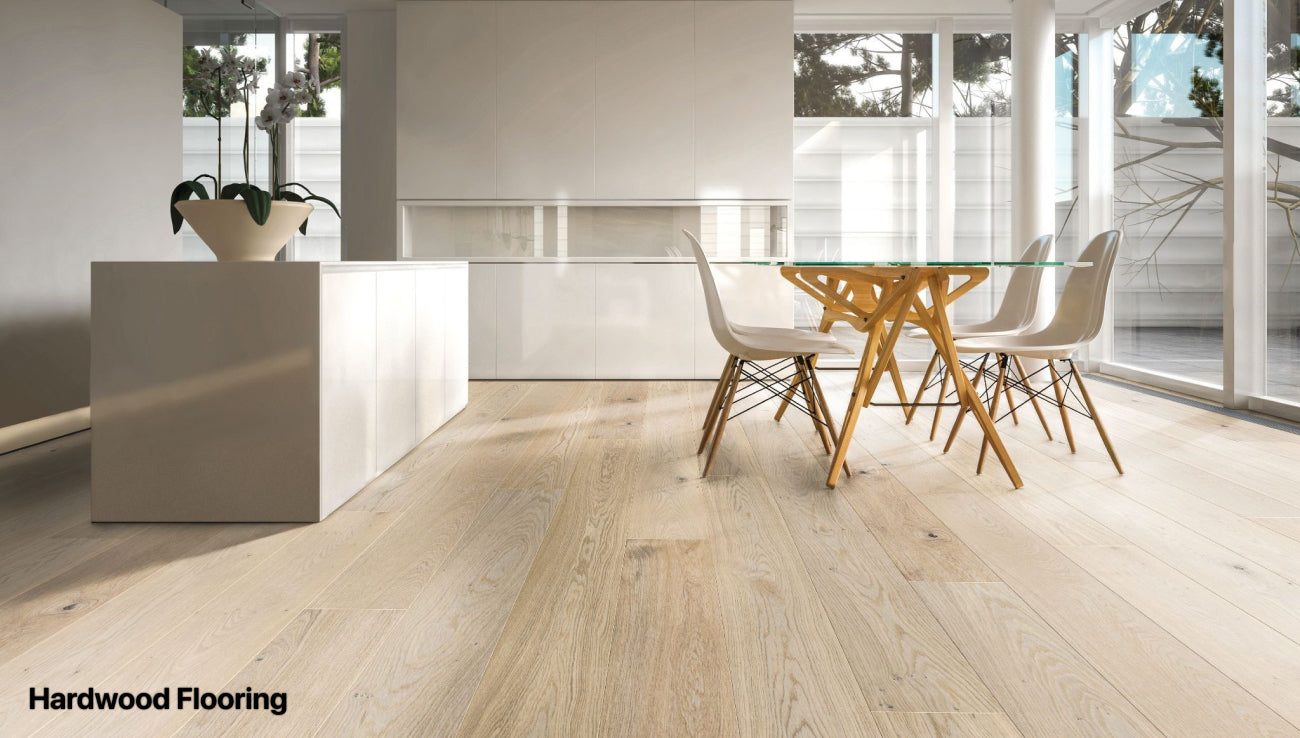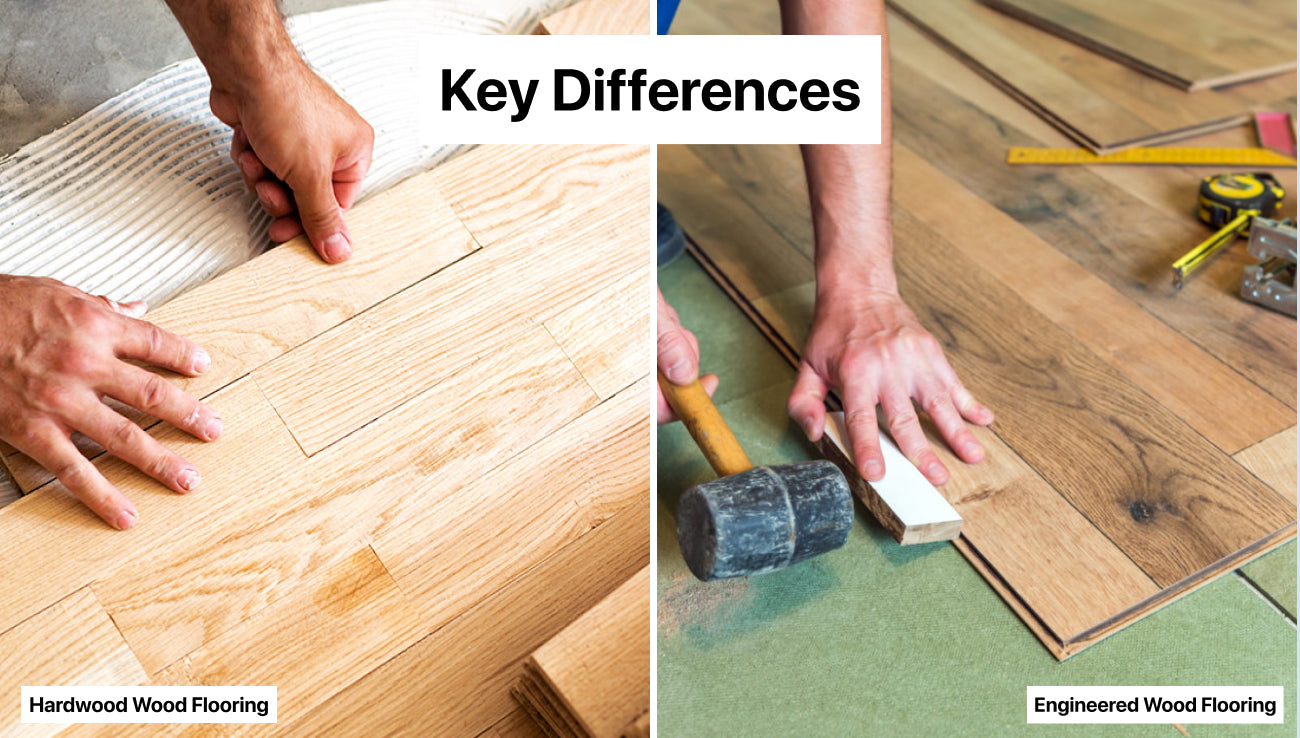Are you constructing a new house or making renovations? Or perhaps deciding on a particular project's flooring option? The decision usually comes down to the choice of engineered hardwood vs hardwood. The distinctions between these must be taken into account when making your choice.
Selecting the choice that best fits your lifestyle is crucial. Making the best decision for your room might be aided by this helpful guide. Discover the advantages of both solid hardwood and engineered wood flooring, along with their distinctions and longevity, by reading this comprehensive guide.
What is Hardwood Flooring?

Hardwood floors are preferred by many households. Hardwood flooring increases the potential for sale of your space and is both visually pleasing and long-lasting. It is composed of individual wood boards. Specific pieces of wood, such as walnut, maple, or oak, can persist for many years with appropriate care. It has distinct patterns and colors. Because of these reasons, hardwood lends an antique feel to any interior design.
What is Engineered Hardwood Flooring?

Engineered hardwood floors are a contemporary take on the traditional hardwood floor. They are made of plywood and numerous layers of wood. The uppermost layer of engineered hardwood flooring is constructed out of real hardwood veneer. This layer gives it an excellent appearance and feel.
Below this veneer are numerous layers of high-density fiberboard (HDF) or plywood, offering more suitable stability and resistance to moisture. This modern shape makes engineered hardwood a fantastic preference for regions where solid wood might warp or buckle, such as basements or over concrete slabs.
Key Differences: Engineered Wood Flooring vs Hardwood

Think of engineered hardwood flooring like a sandwich. It’s made up of several layers. It has a real hardwood layer on top. On the other hand, traditional hardwood flooring is more like a solid piece of wood. The main difference is that the engineered type is designed to be more stable, especially in areas with fluctuating humidity levels, while solid hardwood can be sanded and refinished more times.
The additional differences are as follows:
Moisture Resistance
Engineered hardwood: Compressed wood layers offer better resistance to temperature and moisture changes.
Hardwood: More susceptible to moisture damage due to natural composition.
Installation
Engineered hardwood: Offers multiple installation methods. The methods include floating, gluing, or nailing.
Hardwood: Typically requires nailing to a wood subfloor. This is generally a more labor-intensive process.
Cost
Engineered hardwood: Generally a more affordable option. Provides a high-end appearance at a lower price point.
Hardwood: Often more expensive upfront due to material and installation costs.
Refinishing
Engineered hardwood: This can be refinished. But less frequently due to the thickness of the top layer.
Hardwood: Can be sanded and refinished multiple times throughout its lifetime. Thus, it offers greater longevity.
How Long Does Engineered Hardwood Last?
20 to 80 years is the typical lifetime of engineered hardwood flooring. How well-made the flooring is affects its lifespan. The state of the flooring's maintenance is another factor. And the veneer layer's thickness too. Similar lifespans are observed in engineered wood and solid hardwood. Its lifespan may be shortened by the fact that engineered wood is less refinishable.
Which is Better: Engineered Hardwood vs Hardwood Flooring
The decision between engineered hardwood vs solid wood flooring is influenced by several variables. These variables include your spending limit and the location of the flooring installation. You should also consider your aesthetic preferences. Moreover, the level of care and maintenance you can provide:
- Temperature and Moisture: Engineered hardwood doesn't warp easily. It can be a better option if you're putting flooring in a damp environment.
- Budget: When installation may be more complicated, engineered wood frequently provides a more cost-effective option than solid hardwood.
- Beauty and Durability: Between hardwood vs engineered wood flooring, solid hardwood flooring is incomparable for individuals looking for status and durability. This wood can be sanded and polished several times.
Conclusion
Ultimately, in the battle of engineered hardwood vs hardwood, both flooring types are comparable. It's important to consider your daily routine and the specific needs of your area. You should also consider your long-term renovation goals while making your choice. At BuildMyPlace, we provide an extensive selection of premium hardwood and engineered wood flooring alternatives. Use our video chat tool to speak with our professionals and choose wisely.
FREQUENTLY ASKED QUESTIONS
Q: Can I lay engineered hardwood over concrete?
A: To provide a sturdy and moisture-resistant flooring option, engineered hardwood may be installed over concrete due to its structural design.
Q: Is engineered hardwood subject to acclimatization before installation?
A: It is important to allow engineered hardwood to acclimate to the atmosphere of your house. This minimizes post-installation expansion and contraction.
Q: Will the value of my property rise if I have engineered or hardwood floors?
A: Absolutely. Due to their longevity and attractiveness, both flooring options are popular. They increase the value of your house.
Q: How should my wooden flooring be cared for?
A: To prevent scratches, use felt pads beneath furniture, shield floors from dampness, sweep or vacuum often, and use special wood floor cleaners for thorough cleaning.
Q: Does wood flooring come in eco-friendly options?
A: Indeed, for more environmentally friendly flooring, seek out FSC-certified hardwood and engineered flooring. They are formed with low-VOC coatings and eco-friendly cores.


